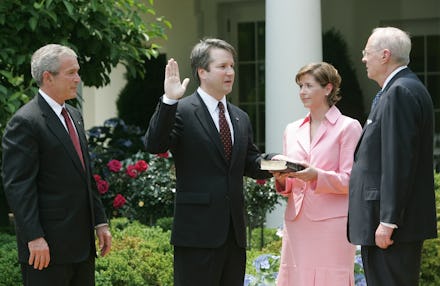Trump nominates Brett Kavanaugh to the Supreme Court

President Donald Trump on Monday nominated Brett Kavanaugh to the Supreme Court, capping off an interview process and days of wide speculation about his second pick for the high court.
“Other than matters of war and peace, this is the most important decision a president can make,” Trump said before announcing Kavanaugh as his pick.
“I will always strive to preserve the Constitution of the United States and the American rule of law,” Kavanaugh said, accepting Trump’s nomination.
Trump chose Kavanaugh from a pool of four finalists, with whom he’s met and has sought input on since June 27, when Supreme Court Associate Justice Anthony Kennedy announced his retirement.
Kavanaugh, 53, has sat on the Court of Appeals in Washington, D.C., a position he was nominated for by former President George W. Bush. He also served as a clerk for Kennedy.
Kavanaugh’s confirmation took years, as he was accused of hyper-partisanship for his role in independent counsel Kenneth Starr’s investigative team, which ultimately recommended impeaching then-President Bill Clinton.
“Mr. Kavanaugh would probably win first prize as the hard right’s political lawyer,” Sen. Chuck Schumer (D-N.Y.) said in 2004, according to the New York Times.
Kavanaugh also argued in 2009 that presidents “should not be distracted by civil lawsuits, criminal investigations or even questions from a prosecutor or defense attorney while in office” — a position that is sure to raise eyebrows given special counsel Robert Mueller’s investigation into potential collusion between the Trump campaign and the Russians.
With the nomination now official, Kavanaugh will face a Senate confirmation process with zero margin for error.
Senate Majority Leader Mitch McConnell warned Trump that confirming Kavanaugh would be more difficult than confirming some of the other picks in the final group of four.
Republicans currently hold a 51-seat majority and are down a vote, with GOP Sen. John McCain still in Arizona battling brain cancer.
That means Republicans can lose only one of their own senators for Kavanaugh to win confirmation. All eyes will be on Sens. Susan Collins of Maine and Lisa Murkowski of Alaska, both of whom have said they do not support overturning Roe v. Wade, the landmark Supreme Court case that protects a woman’s right to an abortion.
Before the pick was announced, Senate Majority Whip John Cornyn (R-Texas) told CNN on Monday afternoon that he was confident whomever Trump nominated would be confirmed.
Nevertheless, Republicans are already releasing ads attacking Senate Democrats up for re-election in 2018 for failing to back the nominee.
Missouri Attorney General Josh Hawley, who is running against Democratic Sen. Claire McCaskill in November, issued an ad warning voters that McCaskill “wants liberals in charge.”
Some Democrats up for re-election in November have already said they are not voting for Trump’s pick, including Sen. Bob Casey (D-Pa.) who tweeted Monday that Trump’s nominee “represents a corrupt bargain with the far Right, big corporations and Washington special interests.”
Meanwhile, Senate Minority Leader Chuck Schumer (D-N.Y.) said whomever Trump nominates has an “obligation to share their personal views” on abortion rights and health care.
“These two rights, affordable health care and a woman’s freedom to make sensitive health care decisions, hang in the balance with this nominee,” Schumer said in a speech on the Senate floor. “The views of President Trump’s next court nominee could very well determine whether the Senate proves or rejects this nomination.”